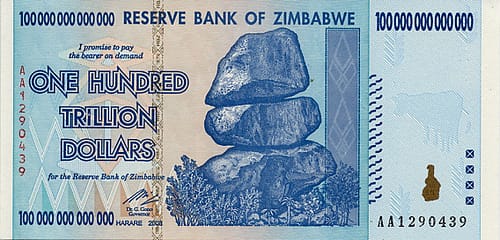One Hundred Trillion Dollars

One Hundred Trillion Dollars
One Hundred Trillion Dollars
Sums were never my strong suite in school. Luckily my brother, David, two and a half years younger than me, given the introductory sample to work from, could always be counted on to do my homework in a jiffy.
One Hundred Trillion Dollars
In 1985 my husband, Jan, a Western (Geophysical) man, at their head office in Houston Texas, got an assignment to teach seismic navigation to the folks at Petrobras, in Rio de Janeiro, Brazil. It was summer in Houston which makes Natal, South Africa, seem temperate. I seized on it. We were going too.
We had a suite of rooms at the Copacabana Palace, the last of the opulent casino hotels in Rio, still sporting a vast writing room, ballrooms with great huge chandeliers and a swimming pool with an island in it. We started out with a breakfast smorgasbord of cold meats, the likes of which we’d never seen before. Roadside vitaminas and coffee strong enough to stand up a spoon kept us going until evening, when we dined on pigeon eggs for hors doeuvres (Andrew sick at the idea) and a lavish churrascaria.
Jan commuted to Petrobras in town daily. There had been a coup earlier in the year but everyone, from the waiters to the concierge, was most attentive. It was all a case of zeros. Brazil planned to solve all its problems by printing money. The notes were big and colorful. How much should a newspaper cost today: four zeros or five or perhaps even six?
“You’re paying too much,” said Jan.
Even the kids were offering to help me out with zeros.
The concierge was a magician. Before I knew it we had a taxi driver hired for the month that spoke Australian.
“I’m sure you’re paying too much,” said Jan, usually so staid, now seriously agitated.
“English comes at a price.” I replied. “How lucky are we to find a Portuguese who speaks, well almost, the Kings English? It’s worth every cruzeiro.”
The money seemed like the people, free and easy. We cruised to Ipanema where the girls wore the itsyiest, bitsiest, teeniest, weeniest, polka dot bikini’s we’d ever seen. Or was it that they just couldn’t afford more fabric? We rode the cable car to Sugarloaf Mountain and explored quaint fishing villages near and far.
With the almighty dollar to back us up, we had never had it so good, before or since.
The inflation rate peaked in 1990, a record 30,000%. It wasn’t until 1994 that the Brazilians got real with their currency and printed the real and the number of zeros went back to simple numbers.
And here I am in 2011, battling the zeros looking at this hundred trillion Zimbabwe note I’ve just been given. My mind is boggled again! It took one billion dollars to buy a loaf of bread there just two years ago with inflation at 90 sextillion percent. (that’s 90 with 20 zeros after it, just incase you are mathematically challenged like me). It took box loads of notes to buy groceries if you could find any to buy.
This is inflation not just through the roof but into deep space. One trillion dollar bills laid end to end would make a chain that stretches from earth to the moon and back again 200 times before you ran out of dollar bills. One trillion dollars would stretch nearly from the earth to the sun. It would take a military jet flying at the speed of sound reeling out a roll of dollar bills behind it 1400 years before it reeled out one hundred trillion dollars.
There hasn’t been a coup yet in Zimbabwe but the government finally got sensible because, honestly, nobody could do the math anymore, not even the Minister of Finance. They scrapped the Zimbabwe dollar and disposed of it literally down the toilet because toilet paper was another thing that was in short supply. Sometimes practicality wins.
Zimbabwe has gone to “dollarization” trading in U.S. dollars. Things are looking up. A loaf of bread costs two U.S. dollars. Bread being the staff of life, two’s are in big demand, the supply short. Thomas Jefferson’s face gets grubby so a good wash is in order every once in a while and the notes get hung out to dry on the washing line along with the laundry. Are things coming clean?
Perhaps my hundred trillion dollars will become a collector’s item and bulk up my retirement in America. They say a million US dollars these days is not enough to see you through old age. With our own additional one and a half trillion dollar debt this year– that’s about thirteen dollars for every man, woman and child added every day–who knows who will have the last laugh?
Many thanks to Bob Atkinson of Pretoria, South Africa for the crisp clean hundred trillion dollar note.
